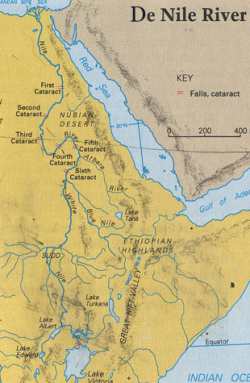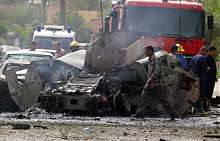 Four Syrians held by the Lebanese authorities have confessed to bombing two buses in Lebanon last month, killing three people and wounding 23, Lebanon's interior minister said on Tuesday. The blasts, which occurred minutes apart, tore through two buses traveling on a busy commuter road, killing three people and wounding 20. A higher death toll was averted because passengers from the second bus had rushed out to help the victims of the first explosion. Hassan al-Sabaa said the men were members of Fateh al-Islam, a small Palestinian group which he linked to Syrian intelligence. Fateh al-Islam broke away last year from Fateh al-Intifada, another Palestinian group. A fifth man, also Syrian, was on the run, Sabaa said.
Four Syrians held by the Lebanese authorities have confessed to bombing two buses in Lebanon last month, killing three people and wounding 23, Lebanon's interior minister said on Tuesday. The blasts, which occurred minutes apart, tore through two buses traveling on a busy commuter road, killing three people and wounding 20. A higher death toll was averted because passengers from the second bus had rushed out to help the victims of the first explosion. Hassan al-Sabaa said the men were members of Fateh al-Islam, a small Palestinian group which he linked to Syrian intelligence. Fateh al-Islam broke away last year from Fateh al-Intifada, another Palestinian group. A fifth man, also Syrian, was on the run, Sabaa said."It is no secret that Fateh al-Islam is Fateh al-Intifada and Fateh al-Intifada is part of the Syrian intelligence-security apparatus," Sabaa told reporters.
| Picture: Shaker al-Absy (R), head of Fateh al-Islam, holds a news conference with unidentified colleagues in al-Bared refugee camp near the port-city of Tripoli in north Lebanon March 13, 2007. Fateh al-Islam denied any link to the bus bombs in the Christian village of Ain Alaq. The sign on the wall reads, " There is no God but Allah, Prophet Mohammad is the messenger of Allah". |
The bombing on February13 was a day before the second anniversary of the assassination of former Prime Minister Rafik al-Hariri, whose killing many Lebanese blame on Syria. Damascus denies involvement. The bombing had been added to a list of attacks being investigated by a U.N. inquiry into the Hariri killing. Information Minister Ghazi Aridi said the men had been instructed to carry out the attack before February 14. "They said that their bosses had asked them to be ready to carry out another operation," Aridi said, adding that the target was to be an office of the Kataeb Party, a Christian faction which is part of the anti-Syrian governing coalition.
Pierre Gemayel, a cabinet minister and Kataeb leader, was assassinated in November. Ain Alaq is in the area of Bikfaya, home to Gemayel's father and Kataeb leader, former President Amin Gemayel. Security sources said earlier that six members of Fateh al-Islam had confessed to the Ain Alaq bombs.
Fateh al-Islam first emerged in the Palestinian refugee camp of Bedawi in north Lebanon. Governing coalition leaders said the February 13 bombing was designed to deter their supporters from attending a Beirut rally to mark the Hariri killing and to bolster their camp against a political challenge by the opposition. The opposition includes Hezbollah and Amal, which are both close allies of Syria .
Ring Leader
The security officials told The Associated Press that the ring leader of the plot was a Syrian, Mustafa Sayour, who had confessed to planting the bombs.
In addition to the arrests, police officers confiscated a "large quantity of explosives" that were hidden in the Beirut apartment of Mustafa Sayour
Members of the network, according to the source, infiltrated into Lebanon from Syria last November under the cover of the so-called "Fatah-Islam" group, which was set up by Syrian intelligence with the objective of carrying out terrorist attacks to destabilize Lebanon and block the ratification of the international tribunal which would try suspects in the 2005 Hariri murder and related crimes.
Absy is wanted in Jordan for murdering Laurence Foley an American diplomat in 2002, but Syria has refused to hand him over to the Jordanians .

 (KUNA) -- Syria on Wednesday denied Lebanese allegations that a Palestinian splinter group, Fatah Al-Islam, had detonated bombs in two passenger buses in Lebanon last month by instigation from Syria. Syrian Interior Minister Bassam Abdel-Majid, who was asked to comment on the Lebanese allegations regarding the Palestinian group, denied the allegations arguing that the group (Fatah Al-Islam) was linked to Al-Qaeda and planned to launch terrorist attacks in Syria before its underground activities were uncovered in August 2002.
(KUNA) -- Syria on Wednesday denied Lebanese allegations that a Palestinian splinter group, Fatah Al-Islam, had detonated bombs in two passenger buses in Lebanon last month by instigation from Syria. Syrian Interior Minister Bassam Abdel-Majid, who was asked to comment on the Lebanese allegations regarding the Palestinian group, denied the allegations arguing that the group (Fatah Al-Islam) was linked to Al-Qaeda and planned to launch terrorist attacks in Syria before its underground activities were uncovered in August 2002. A prominent anti-Syrian journalist was killed when a bomb exploded in his car in Beirut on Thursday in an attack the opposition blamed on Syria and its Lebanese security allies. The killing of columnist
A prominent anti-Syrian journalist was killed when a bomb exploded in his car in Beirut on Thursday in an attack the opposition blamed on Syria and its Lebanese security allies. The killing of columnist